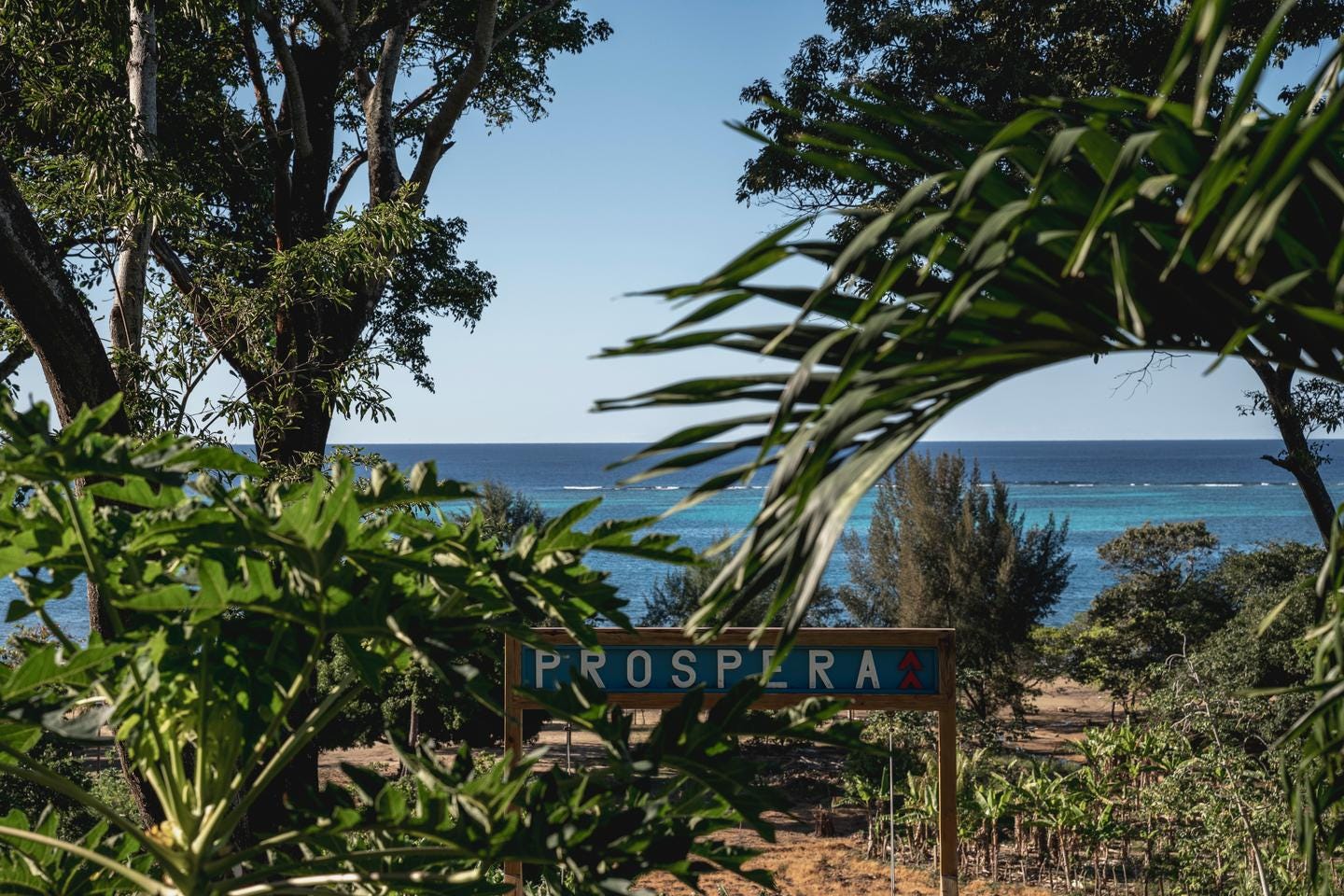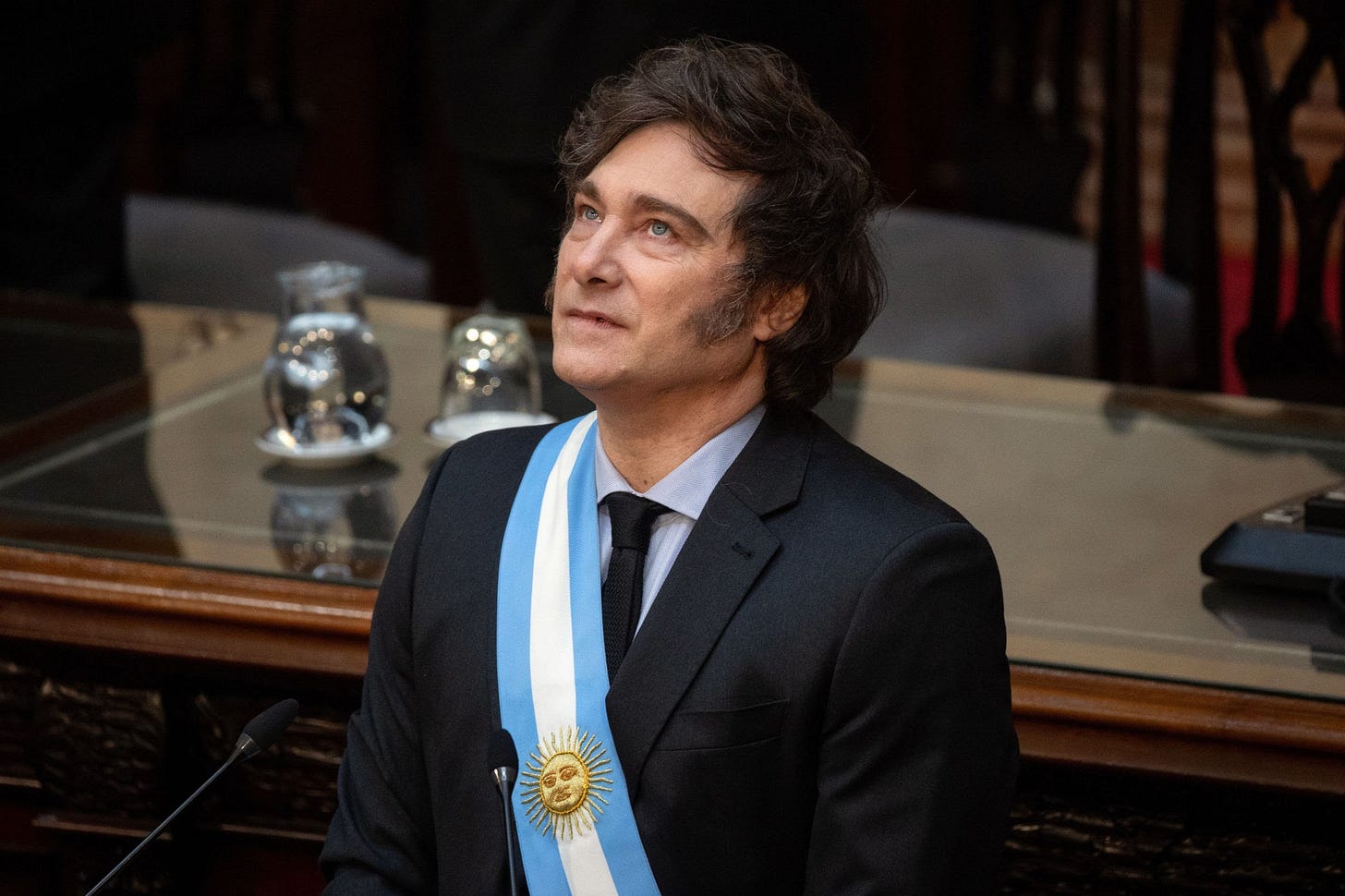Welcome to episode 10 of weekly freedom news, on Network States, individual sovereignty, Libertarian progress, developments in privacy (tech), hard money, economic (de-)regulation and more.
Anarchism is a set of ideas that challenges the legitimacy of political authority and advocates for self-government, emphasizing rational modes of progress. Argentine economist and politician Javier Milei embodies this philosophy through his advocacy for free-market principles, non-revolutionary approaches to transitioning towards libertarianism, and a more limited government. Other notable thinkers which come from this tradition include the American individualist Benjamin Tucker and the British philosopher William Godwin.
⚡Top of the Agenda
ZEDEs in Honduras are still in purgatory but Trump may apply some pressure
Javier Milei hops and Lex Fridman: A Breakdown of the anarchist president on a podcast
1. Are Our Little Freedom Zones Still Free? An Update on ZEDEs in Honduras
Yes they are still free, but it does not look great for the future.
The Supreme Court of Justice for Honduras has received the missing signatures to rule ZEDEs (Economic Development and Employment Zones) unconstitutional. The ruling is now being submitted to the National Congress.
U.S. Republican Congresswoman María Elvira Salazar warned Honduras about expropriating ZEDEs, suggesting there would be a "new sheriff in town" in January.
Honduran Foreign Minister Enrique Reina responded critically to Salazar's comments, describing them as crude politicization and emphasizing that international relations are governed by law, not "Western movie" justice.
Salazar and Senator Bill Cassidy had previously warned that eliminating ZEDEs could harm the Honduran economy and increase irregular migration, while also making Honduras ineligible for the Americas Act.
The Americas Act is proposed U.S. legislation aimed at stabilizing Latin America through investment opportunities, economic growth, and job creation in the Western Hemisphere.
On X, Alex Urgorji argus that a Trump presidency may have different outcomes for our little freedom zones. Let’s hope it true.
2. Javier Milei on the Lex Fridman Podcast: A Breakdown
On November 20, President of Argentina Javier Milei appeared on the Lex Fridman podcast and spoke about a wide range of topics; from economic freedom, the free market and poverty, to Trump, advice to young people and his own personal faith.
We’ll mainly be covering the topics related to freedom, economics and broader political themes.
Economic Freedom
While studying economic growth between 2013-2014, Milei noticed a dramatic increase in per capita GDP and living standards since 1800.
Reading Murray Rothbard's article "Monopoly and Competition" challenged his previous microeconomic teachings and prompted an intellectual shift.
He began intensively reading Austrian School economists like Mises, Rothbard, Hayek, and Hoppe, and dedicating substantial time to studying their works.
Another pivotal moment was reading Mises' "Human Action", which he described as a "true revolution in my head" that fundamentally transformed his economic thinking.
Meeting and becoming friends with Alberto Benegas Lynch further solidified his approach to understanding the ideas of economic freedom.
Anarcho-capitalism
Milei identifies as an anarcho-capitalist in principle, defining liberalism as "unrestricted respect for the life project of others" based on non-aggression and defense of life, liberty, and property.
In practice, and within his presidency, he is a minarchist, advocating for minimizing state size and actively removing regulations.
He follows the philosophical progression of economic thinkers like Friedman, distinguishing between classical liberals, minarchists, and anarchists.
Milei rejects the "nirvana fallacy" of perfect ideological purity, believing in pragmatic steps toward freedom and criticizing those libertarians who only critique without taking action.
His ultimate goal is to gradually advance toward anarcho-capitalism by changing achievable restrictions and working within current institutional limitations, comparing political progress to adapting to an imperfect but necessary situation.
Presidency and reforms
Milei inherited an economic crisis with 3,700% annual inflation and 50% poverty rate, and implemented drastic measures including reducing government ministries from 15 to 8 and laying off 50,000 civil employees.
He also achieved fiscal balance in the first month of administration, reducing fiscal deficit from 15% to 0% and eliminating economic subsidies while restoring utility rates.
Dramatically reduced inflation from potentially 17,000% annually to approximately 2.5% annually, without controlling prices or fixing exchange rates, and cleaned up the Central Bank's balance sheet.
Implemented structural reforms that jumped Argentina 90 places in economic freedom rankings, with projections to potentially double GDP per capita in 10 years and reduce poverty from 57% to 46%.
Committed to continuing reforms to make Argentina the "freest country in the world," including eliminating political party financing, implementing single paper ballot voting, and removing mandatory political primaries.
Poverty
Previous government masked true poverty levels through price controls and distorted economic indicators, artificially suppressing reported poverty rates.
Removing price controls revealed actual poverty rate of 57% (compared to previous 41%), but this transparency allowed products to reappear on shelves and economic activity to recover.
Argentina found its economic activity floor in April, with real wages growing monthly above inflation and informal sector wages increasing most rapidly.
Eliminated inflation and fiscal deficit (15 GDP points) returned resources to citizens, reduced country risk from 3000 to 770 basis points, and improved resource allocation.
Corruption
Reduced street blockades by cutting social plan middlemen and implementing an anti-blockade protocol.
Ended corruption in public works and provincial transfers by making accounting transparent and eliminating discretionary funding mechanisms.
Aggressively pursued judicial actions, including convicting former president of Argentina Cristina Fernández de Kirchner for corruption and removing privileged political pensions.
Challenged media corruption by removing official advertising and supporting open communication platforms like X (Twitter), breaking traditional media's monopoly on information.
Freedom
Milei argues that socialism has failed economically and now attempts to continue class struggle through cultural battles, including gender ideology, environmental policies, and identity politics.
He believes liberals were originally champions of equality and rights, but modern leftist movements have radicalized these concepts, creating divisive narratives that ultimately harm society.
Milei emphasizes the importance of fighting on three fronts: economic (free-market capitalism), political (liberal democracy), and cultural, warning that neglecting the cultural battle can lead to institutional takeover by socialist ideologies.
Milei criticizes current progressive movements, arguing that initiatives like the Ministry of Women in Argentina have been ineffective, and that socialist-inspired policies ultimately generate poverty and restrict individual liberties.
US and Argentinian Relations
Milei has positioned Argentina as a geopolitical ally of the United States and Israel, emphasizing alignment with Western liberal democratic values and opposition to autocratic systems.
During his presidential campaign and subsequent governance, Milei focused on three key pillars: economic liberalization (including spending cuts and currency competition), tough security policies, and international realignment.
Regarding currency policy, Milei advocates for currency competition and eventual elimination of the central bank, with a gradual approach that involves stabilizing the bank's finances and allowing natural dollarization.
Milei sees deep potential for strengthened commercial and investment ties with the United States, and has expressed interest in Argentina potentially joining NATO as part of his commitment to Western democratic principles.
The Free Market
Milei defines the market as a voluntary exchange system based on private property rights, arguing that free market capitalism is humanity's most effective resource allocation mechanism.
He believes successful market participants are "social benefactors" who can only prosper by serving others with higher quality goods at better prices.
According to Milei's interpretation of economists like Mises and Hayek, there are only two economic systems: free enterprise capitalism and socialism, with any "middle ground" inevitably trending towards socialism.
He challenges the concept of "market failures," viewing them as mathematical constructs created by neoclassical economists that ultimately increase government intervention rather than solving problems.
Advice for Young People
Milei advises never giving up and always being fully committed to one's principles, preferring to attempt and potentially fail rather than never try at all.
He emphasizes living consistently with what makes you happy and focusing on doing what you believe is necessary without worrying about external impact or recognition.
For the full transcript, click here.
Also this week
UN Proposes Crypto Climate Tax
The United Nations climate conference is considering a new crypto mining tax of $0.045 per kilowatt-hour of electricity used. This could potentially generate $5.2 billion annually for climate action funding.
The proposal is led by the Global Solidarity Levies Task Force (Kenya, Barbados, and France) and aims to use the funds to provide funding for less wealthy nations to transition to renewable energy.
The tax rate is based on International Monetary Fund research that accounts for climate change impacts and greenhouse gas emissions.
The proposal is still not concrete, but aims to be ready for the IMF and World Bank spring meetings in April 2025.
Kazakhstan has already implemented a similar crypto mining tax collecting $7 million in 2022, while the US has proposed a 30% tax on miners' electricity consumption, though this may change under the Trump administration.
Reason magazine provides a series of articles on all the things that the government could do away with (for the better).
Interesting media
Events
Ongoing: The Network School, Near Singapore: September 23 - December 23, 2024.
Ongoing: Crypto City Builders - Exploration Program, Próspera ZEDE, Roatán, Honduras: October 19th - November 25th, 2024.
Ongoing: ZuGarden, Bangkok and an Island in Thailand: 10 - 30 November, 2024.
Vitalia Forever, Vitalia City, Prospera ZEDE, Honduras: January 6th - March 3rd, 2025.
Edge Esmeralda 2025, Healdsburg, CA, USA: April 24th - June 21st, 2025
See based.guide’s event page for all events.





